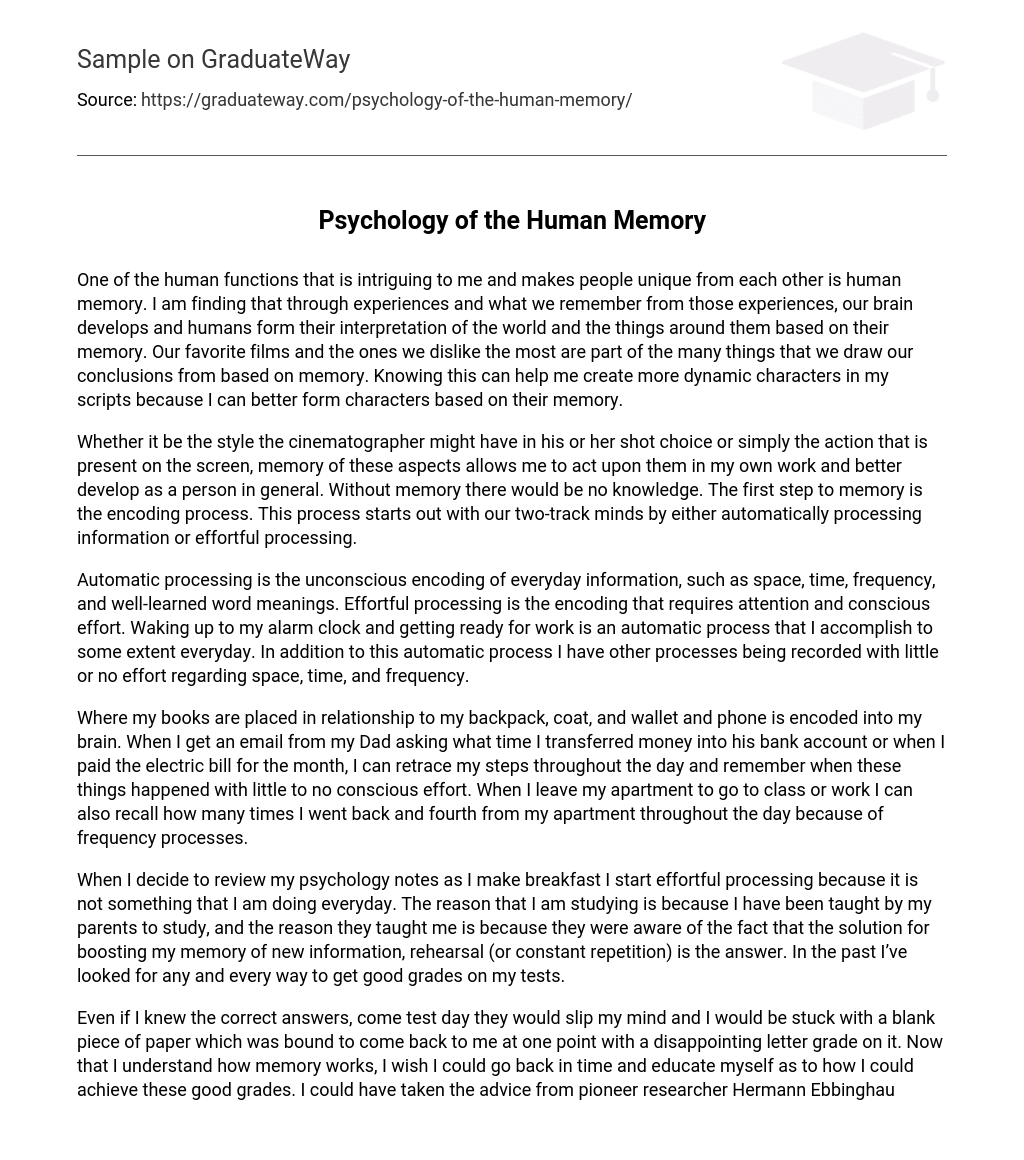The human function of memory is fascinating to me as it distinguishes individuals from one another. Our brain develops and we form our understanding of the world and our surroundings through our experiences and what we remember. Our preferences and dislikings of films, among other things, are influenced by our memory. Utilizing this knowledge, I can create more complex characters in my scripts by taking into account their memories.
The memory that I have about the style of the cinematographer’s shot choice or the action on the screen helps me improve in my own work and personal development. Memory is essential for acquiring knowledge. The encoding process is the first step of memory, where our minds either automatically process information or use effortful processing.
Automatic processing involves the unconscious encoding of various types of everyday information, including space, time, frequency, and well-learned word meanings. On the other hand, effortful processing requires conscious attention and focused effort. Each morning, I engage in the automatic process of waking up to my alarm clock and preparing for work to some degree. Alongside this automatic process, I also effortlessly record other information related to space, time, and frequency.
The spatial arrangement of my books in relation to my backpack, coat, wallet, and phone is ingrained in my memory. When I receive an email from my father inquiring about the time I transferred money to his bank account or paid the monthly electric bill, I can easily retrace my actions throughout the day and recall the specific moments with minimal conscious effort. Similarly, as I leave my apartment for class or work, I can effortlessly remember the number of times I returned to my apartment during the day due to repetitive activities.
When I choose to review my psychology notes while preparing breakfast, I engage in effortful processing because it is not a routine activity for me. I study because my parents instilled in me the importance of studying, as they understood that constant repetition, or rehearsal, is the key to enhancing memory for new information. I have always sought various methods to achieve high scores on my tests.
Even if I had knowledge of the correct answers, during the exam my mind would forget them, leaving me with an empty sheet of paper that would eventually be returned to me with a disappointing letter grade. Now that I comprehend the workings of memory, I desire to travel back in time and educate my past self on how to achieve academic success. I could have heeded the guidance of Hermann Ebbinghaus, a groundbreaking researcher who conducted an experiment involving the random selection of syllables. His findings revealed that the extent to which we remember information is determined by the amount of time devoted to learning it.
According to him, extra practice (or overlearning) enhances learning. I observed that during my test, I could only remember the information from the notes I took on the first day of class and the last day before the test. Now that I have a better understanding of memory, I realize what was happening here. It is referred to as the serial position effect. Certain items are more easily encoded by the human mind than others, and for some unknown reason, the first and last items in a list appear to fit in that category.
The production of stress hormones is activated by stress-related memories, providing more glucose energy to the brain. This process signals the brain about the significance of the event. Simultaneously, clusters in the brain responsible for processing emotions enhance activity in memory-creating regions, leading to more potent and dependable memories. Researchers are currently exploring the development of a drug that can weaken intrusive memories when taken shortly after a traumatic incident, as stated in this psychology book.
My perception of a solution like this is that it offers a way to avoid facing difficult challenges. It appears that regardless of the situation one is facing in this country, there is a lack of support from others, and instead reliance on medication seems to be the only option. Although I am not sure what the exact solution should be, considering that weaker emotions result in weaker memories, why can’t psychiatrists work with patients to achieve the desired effects of the pill? While I personally lack interest in this field of study, I strongly oppose the frequent use of medication.
Flashbulb memories, which refer to clear memories of emotionally significant moments or events, have always intrigued me due to their undeniable truth. Recently, I had a conversation with childhood friends from my grade school days. We recalled a specific incident when a person carrying a shotgun was spotted outside the playground, resulting in a lockdown where we had to go indoors.
They all have vivid recollections of that day, including specific details and moments, thanks to flashbulb memory. After reading the memory chapter, my understanding of how the mind retains information has increased. I used to believe that studying things I already knew was a waste of time, but now I realize that reviewing can still enhance learning. If I want to improve my grade on the upcoming psychology test, I need to adopt this approach!





